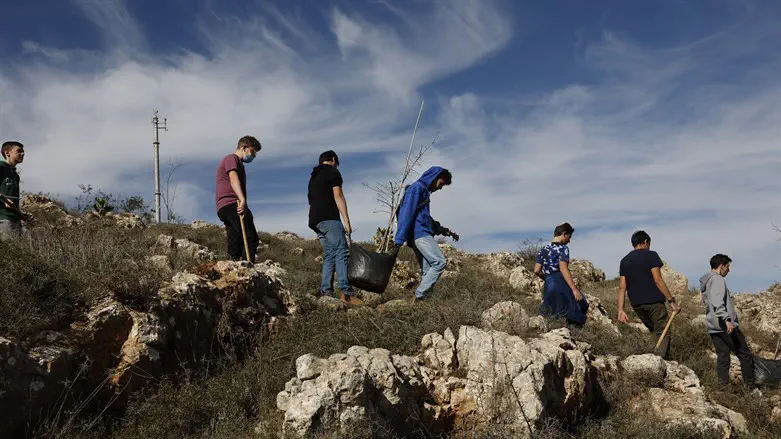
APPLE IN PARADISE – despite the popular view, the fruit eaten by Adam and Eve was probably an etrog; fruit-eating on Tu B'shvat was regarded by Kabbalah as atonement for Adam and Eve’s sin.
BAGHDAD – Baghdadi Jews marked Tu B'shvat by a ceremony in the house of mourning, symbolic of resurrection (as trees become green again, so will the dead return to life).
ETHICS OF TREES – in the Midrash, Jews are like a vine which, though plucked up from one place, can flourish in another; Iike a vine which does not lose its leaves, Israel is never abandoned by God.
FRUIT – Tu B'shvat is a fruit festival. Rabbi Jacob Levi Saphir ate 50 kinds of fruit. Chayyim Vital ate 30 kinds. Most people keep to 15. Some people eat dried, not fresh fruits.
HAGGADAH – we not only celebrate, we philosophise and talk about it.
KEREN KAYYEMET – the KKL (JNF) built up Israel’s forests, giving everyone the opportunity of taking part in the mitzvah; JNF preferred timber trees to fruit trees.
MAN – the Torah likens man to a tree (Deut. 20:19), which has firm roots, is nourished by streams of water (Psalm 1:3), grows up towards the heavens and symbolises God’s blessings.
MESSIAH – springtime is symbolic of the redemptive shofar. Planting trees shows concern for those who will come after us.
ROSH HASHANAH LA’ILANOT – New Year for Trees: originally it lacked ceremonies but eventually became a way of remembering the Holy Land; in Europe the festivities lit up the gloom of the cold weather.
SAFED (TZ’FAT) – the place of origin of many Tu B'shvat ceremonies, especially amongst Sephardim.
SEDER FOR Tu B'shvat – many people create their own Tu B'shvat Seder with scriptural verses that acclaim and describe Israel’s fruit trees; the ceremony culminates in song (Psalm 116:12).
TREES – Trees provide strength and stability (Prov. 3:18); the Bible commands concern for "the trees of the Lord"; tree-planting ceremonies became customary on Tu B'shvat in both Israel and the Diaspora.
Tu B'shvat – 15 Sh’vat, separating the Israeli winter and spring, is the New Year for Trees and began in the Mishnah; the festive ceremonies evolved later.
BANNED BOOKS
Q. A Jewish high school in Sydney recently banned a certain book from study by English students. Does Judaism have any list of banned books?
A. The Mishnah in Sanhedrin chapter 10, warns that a person who reads "external books" (probably meaning the Apocrypha, books excluded from the Tanach) has no share in the World to Come.
Some understand this as referring to the public Synagogue lectionary, not to reading by an individual in private.
However, by the Middle Ages the passage was generally seen as banning even the private reading of unacceptable books.
That this was applied to the sensual poetry of Immanuel of Rome can be understood, but some even placed a ban on Maimonides’ philosophical writings.
The Shulchan Aruch is opposed to certain books (Orach Chayyim 307:16) as is Rabbi Moses Isserles (Shulchan Aruch, Yoreh De’ah 246:4).
In more recent centuries the modernist works of the Haskalah were severely frowned on, though some yeshivah students used to secrete such books under their big Gemara folios and read them when the rabbi was not looking.
The best approach is self-discipline and inculcating the instinct to recognise things to avoid – not only books but TV shows and anything else that does not fit with decency and faith.
Rabbi Dr. Raymond Applewas for many years Australia’s highest profile rabbi and the leading spokesman on Judaism. After serving congregations in London, Rabbi Apple was chief minister of the Great Synagogue, Sydney, for 32 years. He also held many public roles, particularly in the fields of chaplaincy, interfaith dialogue and Freemasonry, and is the recipient of several national and civic honours. Now retired, he lives in Jerusalem and blogs at http://www.oztorah.com